Certified Gemstones
 加工...
加工...
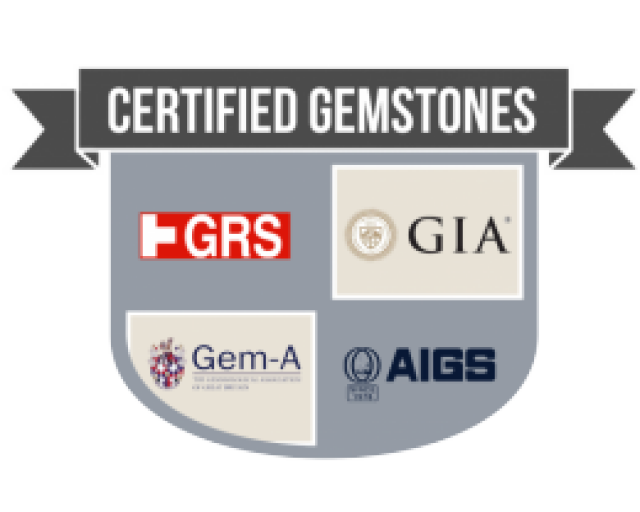 Gem Rock Auctions has one of the largest and most comprehensive ranges of certified gemstones listed on the Internet. This gives our buyers more confidence and trust when purchasing a natural gemstone. With over two thousand certified gemstones on line already it is a great place to starting shopping for gemstones online.
Gem Rock Auctions has one of the largest and most comprehensive ranges of certified gemstones listed on the Internet. This gives our buyers more confidence and trust when purchasing a natural gemstone. With over two thousand certified gemstones on line already it is a great place to starting shopping for gemstones online.
Our Gemstone Sheriff program also adds another layer of assurance by using the collective knowledge of a panel of gemologists to check any gemstone listed on our site. This is useful for gemstones that have not yet been certified.
Why Buying Certified Gemstones Is Important
The market is flooded with glass, plastic and synthetic gemstones. Over the years this has done great harm to the gemstone industry. Gem Rock Auctions is dedicated to selling only natural gemstones to our customers. Having a large selection of certified and tested gemstones ads to the confidence of buyers.
If you are looking to buy a gemstone for the first time and don’t know what some of the terms mean it is best to start with certified gemstones. That way you will know that each stone has been tested by experts (known as Gemologists) and is described 100% correctly.
To give you an example of a gemstone that has caused much confusion and pain for buyers over the years. This is Goldstone. It is sold around the world as a naturally occur gemstone with a beautiful sparkle. in reality this is a man made gemstone (primarily made of glass). You will never find a certified Goldstone because the gemological laboratories will call it Glass.

Certifying Gemstones
There are many reasons why some gemstone buyers want to buy a certified gemstone. More often than not however, they want to buy a certified stone for the assurance they receive from that certification.
Certification gives the buyer the assurance that what they are buying is the real thing. It’s also very helpful and simplifies the resale process, should they decide to later sell the stone.
Usually the gemstone you purchase will not be certified, so it is important to know your options in sending your new investment off to be certified.
When having a stone certified, there are many options available. Some are much better than others, so it’s important to consider all of your options. The cost of certification will also be something for you to consider. The more information you have on the certification, the more you will pay for it.
Different Kinds of Certification
- Brief Reports - This is typically the most inexpensive type of report/certificate you can get. These will give you the basics of the stone tested such as: stone type, weight, size, shape, clarity, & color. There may also be a comment section. In the brief report you will most likely not find the treatments the stone has received. However most times they will include heating/treatments for Sapphires and Rubies. The report will come in a plastic cover about the size of a credit card.
- Brief Report with Photo - These will have all of the information of the basic brief report, but will also include a picture of the stone being certified on the report itself not separate. EMIL of Japan, BGL, AIGS are some laboratories that do these types of reports. They do have some restrictions to the types of stones they will test. Quartz varieties are one they usually don’t test.
- Standard Reports - These reports come in a sealed card/envelope which include the gemstone inside of the report. There is a plastic cover on the back so you are able to see the stone. The information with these reports include: Type of stone, weight, cut, size/measurements, color, & a comment section. Treatments for Sapphires and Rubies will typically be noted in the comment section.
- Full Gemstone Report - This report comes in card form printed on original paper, will be laminated for protection, and will have the signature of the gemologist. This report will tell you the type of stone, description, size, shape, weight, color, clarity, proportion, finish grade, refractive index, specific gravity, variety & trade name, any treatments, and a photo of the gemstone.
Some laboratories will allow all types of stones, where some will have restrictions such as no Quartz or Pearl.
GHI, BGL, AIGS, GIT, GRS, EGL & GIA are some of the major laboratories that offer these types of certifications.
- Restrictions -You will find that some laboratories will not certify certain stones depending on the type of report you choose. You will also find a restriction on the size of stone depending on the report. Many times you will find that if a stone is over a particular weight (say 3 carats) that the price for the certification will increase dramatically.
- Price -The price you’ll pay will depend on the type of report that you buy, and will vary from lab to lab. You can expect to pay anywhere from $35-$200 for these types of reports.
- Time Frames to Certify -Depending on where you live and where the lab you choose is located will help determine the time frame you can expect on having your stone certified. 2-14 days is often the time frame given.
Other Important information
Always make sure if you are buying a stone that is already certified, that it has been certified from a third party, not from within the company you are buying from. It is not acceptable in the gem trade to certify your own stones and then sell them.
There are many trained gemologists that can identify gemstones, but it is always best to have your stone certified at a gemological laboratory specializing in gemstone testing. Gemstone labs will have the means to have the latest testing equipment and a reputation to maintain.
There are many labs around the world that are worthy of certifying your stones so you don’t have to choose the most popular ones (GIA, EGL ect.) However there are benefits to having them done by these distinguished companies as well. They often specialize and engage in leading edge research, and are the experts in their field where treatments are concerned. They are also now trying to certify the origin of the gemstone being tested, but it’s not normally necessary.
Deciding to have your stone certified is a personal choice. It’s highly recommended for those stones that are expensive or rare. It does offer confidence that you have a valuable stone especially when spending a large dollar amount. There are many great uncertified stones available as well. Just make sure to choose reputable dealers and sellers like the sellers on Gemrock Auctions.
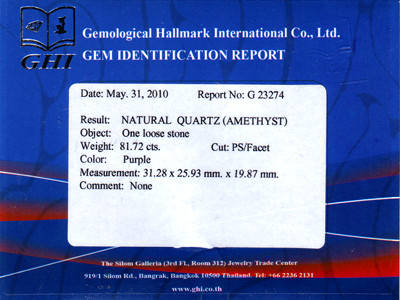

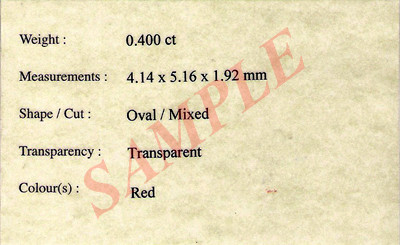
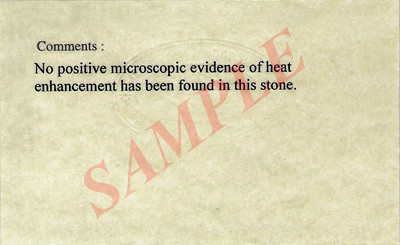
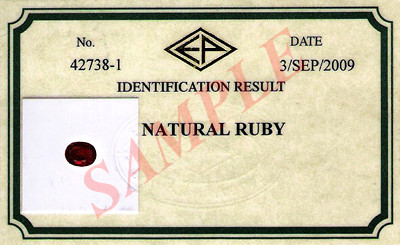
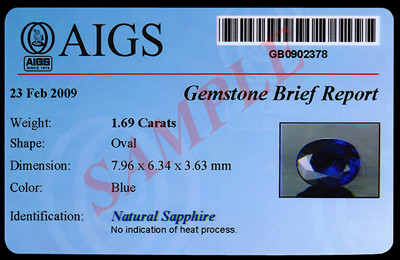

What Does A Gemology Laboratory Do?
 A certified gemology laboratory will investigate a variety of diamonds, colored gemstones and pearls at their research facility.
A certified gemology laboratory will investigate a variety of diamonds, colored gemstones and pearls at their research facility.
There are several major areas in the world recognized for quality certified testing. The United States of America offers several certified laboratories being a major gemstone import / export location as well as Bangkok and Antwerp.
Gemologists in these facilities have academic training from major universities, combined with many years of laboratory experience in gem identification. In conducting gem research they use a variety of advanced scientific instruments.
These laboratories collaborate with a number of Gemological researchers from other Certified Gemologist Laboratory facilities. They all use the same unique access to a wide range of gem materials and worldwide gem-producing localities which allow them to conduct Gemological research that could be carried out by few other organizations.
This is the most important and significant difference in a CERTIFIED GEM and an APPRAISED / EVALUATED GEM! In today’s world a range of synthetic gem materials can be found in the jewelry trade. There are also a number of natural gem materials that have been treated in laboratories to improve their color or appearance.
These products have become increasingly sophisticated, and details of the growth or treatment process are not always revealed, a situation that will cause difficulty for a gemologist who may be visiting your facility for valuations/appraisals & identification. The appraiser is limited in identification when laboratory testing cannot be performed.
The focus of a certified gemologist Lab’s research program is to investigate natural, synthetic and treated gem materials to develop means of identifying them. Why? Because accurate identification is essential for proper disclosure of these goods at the time of their sale, and to maintain consumer confidence in the gem and jewelry industry.
Certified Laboratory Reported Gems VS Appraisal & Valuation
The certified gemstone is most desired over a valuation/appraisal because this gem is usually going to be sold and a buyer may want a report on the gem.
The positive aspect of using a Certified Laboratory is the lab constantly looks at new gem finds, new testing techniques, new treatment techniques and use the latest laboratory equipment needed for gem testing.
A visiting gemologist cannot provide ALL of these things and a permanent hire gemologist can only use what equipment he or his company owns. Many companies hire a Gemologist to visit there Jewelry store or company when a very large number or gems need valuation. The company using the site visiting gemologist many times buy rough and large quantities of gems needing valuation / appraisal at once.
This cost much less in comparison to sending 500 gems to a lab to have each gem tested. If a seller works directly with a mine and buys 500 pounds of rough they can have the rough tested for authenticity, then cut the rough into faceted gems, after the rough is cut into faceted gems they may still want a value placed on the faceted gems therefore a gemologist will provide that service in the end providing a APPRAISAL / VALUATION.
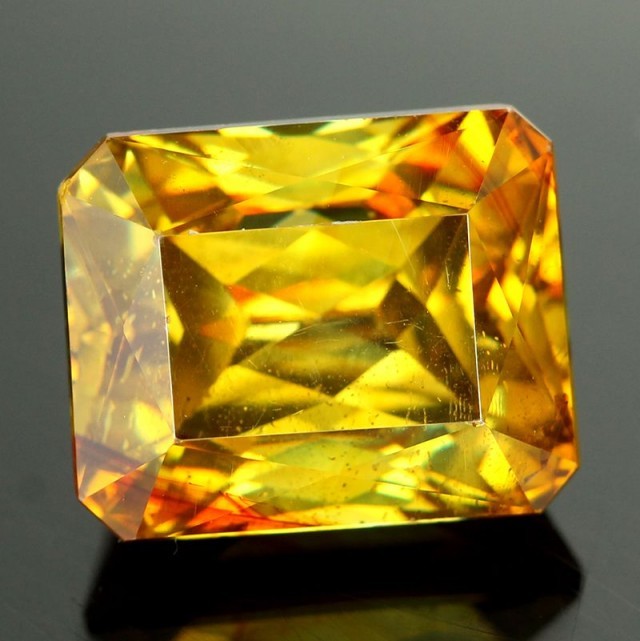
This is not the same as a CERTIFIED GEM… This does not mean the appraisal is worthless it tells the buyer exactly what their selling and that information can be passed on to buyers if the visiting gemologist has created a report ‘per gem’. Many services can be provided excluding laboratory testing.
Laboratory Research Typically Performs The Following Steps
- Determine what information is required by the customer, several Gemstone testing reports are available to customers, Some Certification reports simply offer the Gem type, Size, Cut, and Clarity and whether the gem is natural or lab created. Other certifications offer the above information and the gem is also tested for any treatments. There is usually an additional fee for gemstone treatment testing. When you read the words NATURAL GEM on a report this ONLY means the gem is mined from the earth, this does not mean the gem is not treated. If the seller has requested the Gem being certified to be tested for treatments you will Additional information on the report saying Treatment: Heat. If the treatment is something other than heat like irradiation that will be listed but Heat is considered a treatment and TREATMENTS are applied to gems in rough form in most cases.
- Obtain gem samples for scientific study. The data collected is of greatest research value when we know the origin of the samples—the geographic locality for a natural gemstone, or the growth method for a synthetic gem material, and the treatment method for a treated gem material. They should also try to examine a number of samples that represent the range of properties the gem can exhibit. This allows the testing laboratory to compare samples to the gem you may send for testing.
- Analyse the selected gem samples with a range of scientific equipment to document their properties systematically, and then incorporate the results into a database. Because of the high value of many gem materials, Laboratories are normally limited to non destructive analytical techniques.
- In characterizing gems, testings will focus on documenting visual features seen with the binocular microscope, absorption or luminescence spectra that result from light or other forms of energy interacting with the sample, and non-destructive or minimally destructive analysis of the sample’s chemical composition.
- Establish means of identifying the gem material by analysing the Certified Laboratories database of sample results. This is used for current and future testings.
- Disseminate the results of research through articles in Gemological journals and the jewelry industry trade. Certified Laboratories also require their working gemologist to further education by presentations at industry and scientific conferences on a regular basis, and our research is incorporated in Trade shows and continued education, the reason for this is New gemstones are found around the world that will need to be added to the laboratory database and treatments are updated and changed constantly to offer perfection to gem lovers.
- Certified Laboratories collaborate with other outside researchers or research facilities to acquire additional expertise, learn of new scientific instrument used in detecting gemstone and treatments, they also try to arrange for samples to be treated so they can study them before and after the enhancement process. This allows comparison of gems per gemstone family!
- Lastly a certified gemstone labatory will provide a report for any gemstone you send them for testing. Most ACCREDITED LABS will return these gems inside of a sealed pouch with a report. This will allow you to sell the gem showing the gem was tested for identification, size, treatments etc… What ever you paid for. This gem is sealed to show no type of tampering has occurred and the buyer is confident the same gem mentioned on the report is the gem bought. This is an added feature. If you look at the back of the CERTIFIED SEALED GEMSTONE pouch you will see notation: This gem report is null and void once open. So if you’re selling gems, having them tested do not open them upon return. Photograph them before you mail them for testing. Your gem is worth more once tested and the buyer cannot make any accusation that the gem sealed in the pouch is not the same gem on the report.
When you have a gem that is not sealed this does not mean the report is incorrect but a buyer may not be as confident with a valuation or appraisal as they are with a Certification. Appraisals are usually requested by a buyer who has already bought a gem so they may insure the gem, jewelry or piece in question. VALUATION also is usually provided to a seller who buys large quantities and they want verification the mine is giving them what they are paying for since there have been cased of gems being tampered with in the mine itself!
With any route you decide take to CERTIFY, APPRAISE or VALUATE your gem use an ACCREDITED GRADUATE GEMOLOGIST or LABORATORY who has GRADUATED from an ACCREDITED GEMOLOGICAL SCHOOL. Some gemologist schools allow students to take a few courses outside the school as well as testing. We do advise using an ACCREDITED GEMOLOGICAL SCHOOL & LABORATORY; most accredited laboratories also offer schools. This is where you will want your gems to be certified through.
Gemstone & Diamond Appraisal
Appraisal service should be performed by an independent appraiser. An appraisal should contain a quality analysis, description, and valuation ‘tell you the value’ of the gemstone or jewelry item. While Gem Rock Auctions cannot recommend individual appraisers, there are several national appraisal associations and networks that will be able to help you locate an appraiser in your area.

Many of these associations require their appraisers to have been a GRADUATE GEMOLOGIST as well as additional appraisal training. To locate an appraiser, check your local phone listings or contact one of the following appraisal associations. We discourage buying gems from sellers who offer appraisals on their own products, this service should come from a service outside the Sellers own company so valuations are accurate and not inflated. Some sellers do hire a Gemologist to come to there store or company and perform this service within their business when a large number or gems or jewelry pieces need appraisal / valuation. That seller should not be a regular employee of the company asking for appraisal. THIS SERVICE IS NOT A CERTIFICATION OF THE GEMS BEING APPRAISED, BUT ONLY AN APPRAISAL. Certification offers gemstone testing and other reports a Hired Gemologist cannot offer.
 Gem Rock Auctions has one of the largest and most comprehensive ranges of certified gemstones listed on the Internet. This gives our buyers more confidence and trust when purchasing a natural gemstone. With over two thousand certified gemstones on line already it is a great place to starting shopping for gemstones online.
Gem Rock Auctions has one of the largest and most comprehensive ranges of certified gemstones listed on the Internet. This gives our buyers more confidence and trust when purchasing a natural gemstone. With over two thousand certified gemstones on line already it is a great place to starting shopping for gemstones online.
Our Gemstone Sheriff program also adds another layer of assurance by using the collective knowledge of a panel of gemologists to check any gemstone listed on our site. This is useful for gemstones that have not yet been certified.
Why Buying Certified Gemstones Is Important
The market is flooded with glass, plastic and synthetic gemstones. Over the years this has done great harm to the gemstone industry. Gem Rock Auctions is dedicated to selling only natural gemstones to our customers. Having a large selection of certified and tested gemstones ads to the confidence of buyers.
If you are looking to buy a gemstone for the first time and don’t know what some of the terms mean it is best to start with certified gemstones. That way you will know that each stone has been tested by experts (known as Gemologists) and is described 100% correctly.
To give you an example of a gemstone that has caused much confusion and pain for buyers over the years. This is Goldstone. It is sold around the world as a naturally occur gemstone with a beautiful sparkle. in reality this is a man made gemstone (primarily made of glass). You will never find a certified Goldstone because the gemological laboratories will call it Glass.

Certifying Gemstones
There are many reasons why some gemstone buyers want to buy a certified gemstone. More often than not however, they want to buy a certified stone for the assurance they receive from that certification.
Certification gives the buyer the assurance that what they are buying is the real thing. It’s also very helpful and simplifies the resale process, should they decide to later sell the stone.
Usually the gemstone you purchase will not be certified, so it is important to know your options in sending your new investment off to be certified.
When having a stone certified, there are many options available. Some are much better than others, so it’s important to consider all of your options. The cost of certification will also be something for you to consider. The more information you have on the certification, the more you will pay for it.
Different Kinds of Certification
- Brief Reports - This is typically the most inexpensive type of report/certificate you can get. These will give you the basics of the stone tested such as: stone type, weight, size, shape, clarity, & color. There may also be a comment section. In the brief report you will most likely not find the treatments the stone has received. However most times they will include heating/treatments for Sapphires and Rubies. The report will come in a plastic cover about the size of a credit card.
- Brief Report with Photo - These will have all of the information of the basic brief report, but will also include a picture of the stone being certified on the report itself not separate. EMIL of Japan, BGL, AIGS are some laboratories that do these types of reports. They do have some restrictions to the types of stones they will test. Quartz varieties are one they usually don’t test.
- Standard Reports - These reports come in a sealed card/envelope which include the gemstone inside of the report. There is a plastic cover on the back so you are able to see the stone. The information with these reports include: Type of stone, weight, cut, size/measurements, color, & a comment section. Treatments for Sapphires and Rubies will typically be noted in the comment section.
- Full Gemstone Report - This report comes in card form printed on original paper, will be laminated for protection, and will have the signature of the gemologist. This report will tell you the type of stone, description, size, shape, weight, color, clarity, proportion, finish grade, refractive index, specific gravity, variety & trade name, any treatments, and a photo of the gemstone.
Some laboratories will allow all types of stones, where some will have restrictions such as no Quartz or Pearl.
GHI, BGL, AIGS, GIT, GRS, EGL & GIA are some of the major laboratories that offer these types of certifications.
- Restrictions -You will find that some laboratories will not certify certain stones depending on the type of report you choose. You will also find a restriction on the size of stone depending on the report. Many times you will find that if a stone is over a particular weight (say 3 carats) that the price for the certification will increase dramatically.
- Price -The price you’ll pay will depend on the type of report that you buy, and will vary from lab to lab. You can expect to pay anywhere from $35-$200 for these types of reports.
- Time Frames to Certify -Depending on where you live and where the lab you choose is located will help determine the time frame you can expect on having your stone certified. 2-14 days is often the time frame given.
Other Important information
Always make sure if you are buying a stone that is already certified, that it has been certified from a third party, not from within the company you are buying from. It is not acceptable in the gem trade to certify your own stones and then sell them.
There are many trained gemologists that can identify gemstones, but it is always best to have your stone certified at a gemological laboratory specializing in gemstone testing. Gemstone labs will have the means to have the latest testing equipment and a reputation to maintain.
There are many labs around the world that are worthy of certifying your stones so you don’t have to choose the most popular ones (GIA, EGL ect.) However there are benefits to having them done by these distinguished companies as well. They often specialize and engage in leading edge research, and are the experts in their field where treatments are concerned. They are also now trying to certify the origin of the gemstone being tested, but it’s not normally necessary.
Deciding to have your stone certified is a personal choice. It’s highly recommended for those stones that are expensive or rare. It does offer confidence that you have a valuable stone especially when spending a large dollar amount. There are many great uncertified stones available as well. Just make sure to choose reputable dealers and sellers like the sellers on Gemrock Auctions.







What Does A Gemology Laboratory Do?
 A certified gemology laboratory will investigate a variety of diamonds, colored gemstones and pearls at their research facility.
A certified gemology laboratory will investigate a variety of diamonds, colored gemstones and pearls at their research facility.
There are several major areas in the world recognized for quality certified testing. The United States of America offers several certified laboratories being a major gemstone import / export location as well as Bangkok and Antwerp.
Gemologists in these facilities have academic training from major universities, combined with many years of laboratory experience in gem identification. In conducting gem research they use a variety of advanced scientific instruments.
These laboratories collaborate with a number of Gemological researchers from other Certified Gemologist Laboratory facilities. They all use the same unique access to a wide range of gem materials and worldwide gem-producing localities which allow them to conduct Gemological research that could be carried out by few other organizations.
This is the most important and significant difference in a CERTIFIED GEM and an APPRAISED / EVALUATED GEM! In today’s world a range of synthetic gem materials can be found in the jewelry trade. There are also a number of natural gem materials that have been treated in laboratories to improve their color or appearance.
These products have become increasingly sophisticated, and details of the growth or treatment process are not always revealed, a situation that will cause difficulty for a gemologist who may be visiting your facility for valuations/appraisals & identification. The appraiser is limited in identification when laboratory testing cannot be performed.
The focus of a certified gemologist Lab’s research program is to investigate natural, synthetic and treated gem materials to develop means of identifying them. Why? Because accurate identification is essential for proper disclosure of these goods at the time of their sale, and to maintain consumer confidence in the gem and jewelry industry.
Certified Laboratory Reported Gems VS Appraisal & Valuation
The certified gemstone is most desired over a valuation/appraisal because this gem is usually going to be sold and a buyer may want a report on the gem.
The positive aspect of using a Certified Laboratory is the lab constantly looks at new gem finds, new testing techniques, new treatment techniques and use the latest laboratory equipment needed for gem testing.
A visiting gemologist cannot provide ALL of these things and a permanent hire gemologist can only use what equipment he or his company owns. Many companies hire a Gemologist to visit there Jewelry store or company when a very large number or gems need valuation. The company using the site visiting gemologist many times buy rough and large quantities of gems needing valuation / appraisal at once.
This cost much less in comparison to sending 500 gems to a lab to have each gem tested. If a seller works directly with a mine and buys 500 pounds of rough they can have the rough tested for authenticity, then cut the rough into faceted gems, after the rough is cut into faceted gems they may still want a value placed on the faceted gems therefore a gemologist will provide that service in the end providing a APPRAISAL / VALUATION.

This is not the same as a CERTIFIED GEM… This does not mean the appraisal is worthless it tells the buyer exactly what their selling and that information can be passed on to buyers if the visiting gemologist has created a report ‘per gem’. Many services can be provided excluding laboratory testing.
Laboratory Research Typically Performs The Following Steps
- Determine what information is required by the customer, several Gemstone testing reports are available to customers, Some Certification reports simply offer the Gem type, Size, Cut, and Clarity and whether the gem is natural or lab created. Other certifications offer the above information and the gem is also tested for any treatments. There is usually an additional fee for gemstone treatment testing. When you read the words NATURAL GEM on a report this ONLY means the gem is mined from the earth, this does not mean the gem is not treated. If the seller has requested the Gem being certified to be tested for treatments you will Additional information on the report saying Treatment: Heat. If the treatment is something other than heat like irradiation that will be listed but Heat is considered a treatment and TREATMENTS are applied to gems in rough form in most cases.
- Obtain gem samples for scientific study. The data collected is of greatest research value when we know the origin of the samples—the geographic locality for a natural gemstone, or the growth method for a synthetic gem material, and the treatment method for a treated gem material. They should also try to examine a number of samples that represent the range of properties the gem can exhibit. This allows the testing laboratory to compare samples to the gem you may send for testing.
- Analyse the selected gem samples with a range of scientific equipment to document their properties systematically, and then incorporate the results into a database. Because of the high value of many gem materials, Laboratories are normally limited to non destructive analytical techniques.
- In characterizing gems, testings will focus on documenting visual features seen with the binocular microscope, absorption or luminescence spectra that result from light or other forms of energy interacting with the sample, and non-destructive or minimally destructive analysis of the sample’s chemical composition.
- Establish means of identifying the gem material by analysing the Certified Laboratories database of sample results. This is used for current and future testings.
- Disseminate the results of research through articles in Gemological journals and the jewelry industry trade. Certified Laboratories also require their working gemologist to further education by presentations at industry and scientific conferences on a regular basis, and our research is incorporated in Trade shows and continued education, the reason for this is New gemstones are found around the world that will need to be added to the laboratory database and treatments are updated and changed constantly to offer perfection to gem lovers.
- Certified Laboratories collaborate with other outside researchers or research facilities to acquire additional expertise, learn of new scientific instrument used in detecting gemstone and treatments, they also try to arrange for samples to be treated so they can study them before and after the enhancement process. This allows comparison of gems per gemstone family!
- Lastly a certified gemstone labatory will provide a report for any gemstone you send them for testing. Most ACCREDITED LABS will return these gems inside of a sealed pouch with a report. This will allow you to sell the gem showing the gem was tested for identification, size, treatments etc… What ever you paid for. This gem is sealed to show no type of tampering has occurred and the buyer is confident the same gem mentioned on the report is the gem bought. This is an added feature. If you look at the back of the CERTIFIED SEALED GEMSTONE pouch you will see notation: This gem report is null and void once open. So if you’re selling gems, having them tested do not open them upon return. Photograph them before you mail them for testing. Your gem is worth more once tested and the buyer cannot make any accusation that the gem sealed in the pouch is not the same gem on the report.
When you have a gem that is not sealed this does not mean the report is incorrect but a buyer may not be as confident with a valuation or appraisal as they are with a Certification. Appraisals are usually requested by a buyer who has already bought a gem so they may insure the gem, jewelry or piece in question. VALUATION also is usually provided to a seller who buys large quantities and they want verification the mine is giving them what they are paying for since there have been cased of gems being tampered with in the mine itself!
With any route you decide take to CERTIFY, APPRAISE or VALUATE your gem use an ACCREDITED GRADUATE GEMOLOGIST or LABORATORY who has GRADUATED from an ACCREDITED GEMOLOGICAL SCHOOL. Some gemologist schools allow students to take a few courses outside the school as well as testing. We do advise using an ACCREDITED GEMOLOGICAL SCHOOL & LABORATORY; most accredited laboratories also offer schools. This is where you will want your gems to be certified through.
Gemstone & Diamond Appraisal
Appraisal service should be performed by an independent appraiser. An appraisal should contain a quality analysis, description, and valuation ‘tell you the value’ of the gemstone or jewelry item. While Gem Rock Auctions cannot recommend individual appraisers, there are several national appraisal associations and networks that will be able to help you locate an appraiser in your area.

Many of these associations require their appraisers to have been a GRADUATE GEMOLOGIST as well as additional appraisal training. To locate an appraiser, check your local phone listings or contact one of the following appraisal associations. We discourage buying gems from sellers who offer appraisals on their own products, this service should come from a service outside the Sellers own company so valuations are accurate and not inflated. Some sellers do hire a Gemologist to come to there store or company and perform this service within their business when a large number or gems or jewelry pieces need appraisal / valuation. That seller should not be a regular employee of the company asking for appraisal. THIS SERVICE IS NOT A CERTIFICATION OF THE GEMS BEING APPRAISED, BUT ONLY AN APPRAISAL. Certification offers gemstone testing and other reports a Hired Gemologist cannot offer.
本文是否有幫助?
9人認為這篇文章很有幫助
Gem Rock Auctions
- Written - 11th Jan 2011
- Edited - 1st Aug 2023















